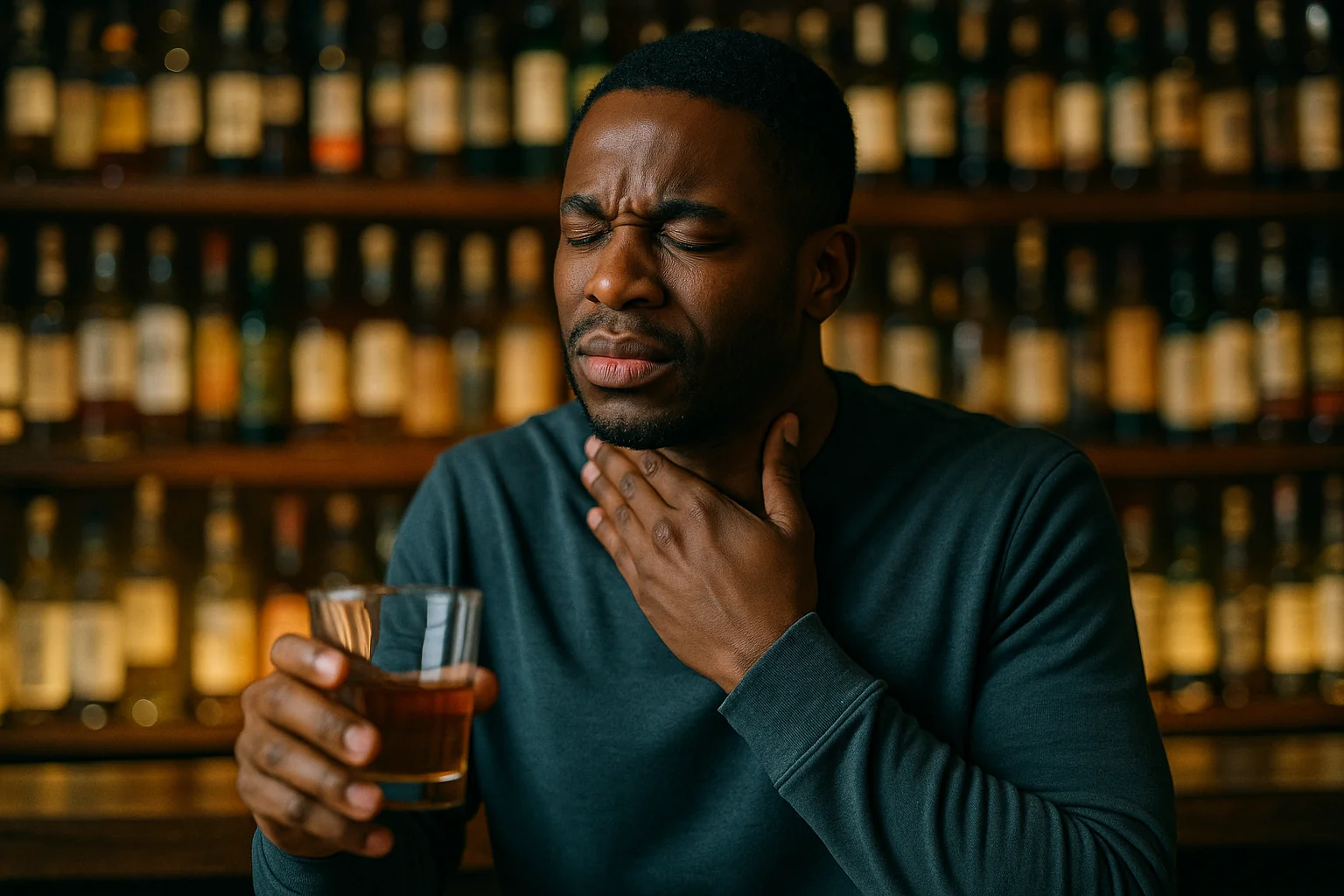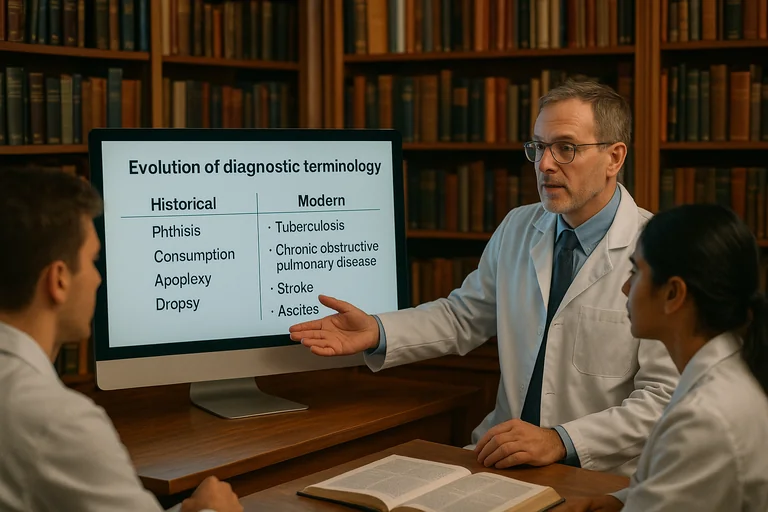A 2 minute assessment to get a personalized mental health or alcohol recovery plan.
A sore throat after drinking is your body's response to dehydration, inflammation, and irritation caused by alcohol—but simple remedies and prevention strategies can help.
What You'll Discover:
- The main causes of a sore throat after drinking alcohol
- How dehydration and acid reflux contribute to throat pain
- Effective home remedies to soothe a sore throat
- Prevention strategies to avoid throat irritation
- When a sore throat requires medical attention
- Long-term risks of chronic alcohol consumption on throat health
You had a great night out, enjoying drinks with friends, only to wake up the next morning with a scratchy, painful throat. While a hangover might be expected, a sore throat can be a surprising and uncomfortable addition.
Before you reach for another cough drop, let's explore why your throat hurts after drinking and what you can do about it.
Why Alcohol Causes a Sore Throat
A sore throat after drinking is a direct result of how alcohol affects your body. Several factors contribute to that raw, scratchy feeling.
Dehydration: The Primary Cause
The most significant reason for a sore throat after drinking is dehydration. Alcohol is a diuretic—it makes you urinate more frequently. This fluid loss leads to dehydration, which causes your mouth and throat to become dry and irritated. As Medical News Today explains, this dryness leads to a scratchy and uncomfortable sensation in the throat.
Inflammation: The Body's Reaction
Alcohol is an inflammatory substance. When you drink, it causes inflammation throughout your body, including the delicate tissues of your throat. This inflammation manifests as redness, swelling, and pain. The more you drink, the more pronounced this inflammatory response becomes.
Acid Reflux: The Hidden Irritant
Alcohol relaxes the lower esophageal sphincter (LES), the muscle that separates your stomach from your esophagus. When the LES is relaxed, stomach acid can flow back up into your esophagus and throat—a condition known as acid reflux or GERD. This stomach acid is highly irritating to the throat lining. Healthline notes that drinking alcohol can cause flare-ups of GERD, with a sore throat being a common symptom.
Vocal Strain: The Party's Price
Think about where you often drink. Parties, bars, and social gatherings are typically loud environments. You may find yourself talking loudly or even yelling to be heard over the noise. This vocal strain, combined with alcohol's dehydrating effects, puts significant stress on your vocal cords, leading to hoarseness and a sore throat.
A Weakened Immune System
Chronic or heavy alcohol consumption weakens your immune system, making you more susceptible to infections. A compromised immune system has a harder time fighting off viruses and bacteria, which can lead to a sore throat and other cold or flu-like symptoms.
How to Soothe a Sore Throat After Drinking
The good news is that there are several effective ways to soothe a sore throat after a night of drinking. Most remedies are simple, natural, and can be done at home.
Hydration is Your Best Friend
Since dehydration is a primary cause, rehydrating is the most important step you can take. Drink plenty of water throughout the day to moisten your throat and alleviate dryness. Herbal teas, clear broths, and drinks with electrolytes can also help. As Healthline suggests, consuming foods or drinks with sodium, potassium, and other essential minerals helps replenish electrolytes lost through increased urination.
The Classic Saltwater Gargle
A saltwater gargle is a time-tested remedy for throat pain. The salt helps reduce inflammation and provides temporary relief from pain and irritation. Mix between a quarter and a half teaspoon of salt with 8 ounces of warm water. Gargle for about 30 seconds and spit it out. You can repeat this as needed throughout the day.
The Power of Honey and Warm Drinks
Honey is a natural remedy that soothes a sore throat. It has antibacterial properties and helps coat and soothe the throat. Try adding a spoonful of honey to a warm cup of herbal tea or warm water with lemon for extra relief.
Rest and Recovery
Don't underestimate the power of rest. Your body needs time to heal, including your throat and vocal cords. If you were up late, you're likely sleep-deprived, which hinders your body's ability to recover. Getting plenty of rest gives your body the chance to repair itself and fight off inflammation.
Over-the-Counter Options
If home remedies aren't providing enough relief, there are over-the-counter options available. Throat lozenges can help numb the throat and provide temporary pain relief. Pain relievers like acetaminophen or ibuprofen can reduce inflammation and pain, but use them with caution after drinking—they can have side effects on the liver when combined with alcohol. Always consult with a doctor or pharmacist before taking any medication after drinking.
Prevention Strategies to Avoid a Sore Throat
The best approach is to prevent a sore throat from happening in the first place. Here are some simple steps you can take to protect your throat when you drink:
Stay Hydrated While You Drink - For every alcoholic beverage you consume, drink a glass of water. This helps counteract alcohol's dehydrating effects and keeps your throat moist.
Pace Yourself - Limiting your alcohol consumption is the most effective prevention strategy. The less you drink, the less likely you are to experience dehydration, inflammation, and acid reflux.
Avoid Smoking - Smoking and drinking are a particularly damaging combination for your throat. Smoke is a direct irritant, and when combined with alcohol, it significantly increases your risk of throat problems, including cancer.
Choose Your Drinks Wisely - Some alcoholic drinks are more likely to cause a sore throat than others. High-proof liquors can be particularly harsh on your throat. Opting for drinks with lower alcohol content and avoiding sugary mixers can help reduce irritation.
Eat Before You Drink - Having food in your stomach slows alcohol absorption and can help prevent acid reflux, which is a common contributor to throat pain.
Being mindful of these strategies means you can enjoy a night out without paying the price with a painful sore throat. This is a key aspect of mindful drinking, a practice that can improve your overall health and well-being.
When a Sore Throat Requires Medical Attention
While a sore throat after drinking is usually temporary and harmless, it's important to know when it might signal something more serious. In some cases, a persistent sore throat could indicate an underlying medical condition that requires professional attention.
See a doctor if:
- Your sore throat is severe or lasts for more than a few days
- You have difficulty swallowing or breathing
- You have a fever, chills, or other signs of a serious infection
- You notice a lump in your neck or persistent hoarseness in your voice
It's crucial to be aware of long-term risks associated with chronic alcohol consumption. As Medical News Today points out, alcohol use is a significant risk factor for several types of cancer, including throat cancer. The chemicals in alcoholic beverages can damage cells in the throat, and this risk is even higher for people who both smoke and drink.
If you're a heavy or frequent drinker and experience chronic sore throats, it's worth talking to your doctor. They can help rule out serious underlying conditions and provide resources if you're struggling with alcohol use disorder.
Toward a Healthier Relationship with Alcohol
A sore throat after drinking is your body's way of telling you it's been irritated and dehydrated. While the remedies and prevention tips discussed here can help you find relief, the best long-term solution is to be mindful of your alcohol consumption and make choices that support your overall health.
If you frequently experience sore throats and other negative consequences from drinking, it might be time to re-evaluate your relationship with alcohol. There are many resources available to help, from support groups to therapy to medication-assisted treatment.
Ready to explore your options? Take the Alcohol Use Assessment to better understand your drinking patterns and discover what approaches might work for you.
References
[1] Medical News Today. "Sore throat after drinking: Treatment and more" https://www.medicalnewstoday.com/articles/sore-throat-after-drinking
[2] Healthline. "Sore Throat After Drinking: Treatment, Prevention, and More" https://www.healthline.com/health/sore-throat-after-drinking




